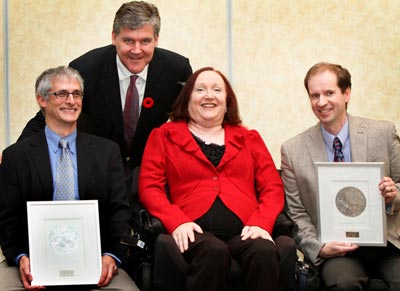 |
| Dr. Michael G. Fehlings, host of the Charles Tator-Barbara Turnbull Lectureship Series in Spinal Cord Injury, leans in from the back for this photo with the ║┌┴¤│ď╣¤═°co-winners of the Barbara Turnbull Award: Dr. Rob Brownstone, left and Dr. Jim Fawcett, right. Centre is Barbara Turnbull, the namesake of their award. Dr. Fehlings is professor of neurosurgery, University of Toronto and director of the university's neuroscience program. |
Two ║┌┴¤│ď╣¤═°Medical School researchers are sharing the spotlight as co-recipients of CanadaÔÇÖs
top honour for excellence in spinal cord research. Dr. Rob Brownstone and Dr. Jim Fawcett received the Barbara Turnbull Award for Spinal Cord Research in Toronto on Friday.
This prestigious award is given annually to the Canadian investigator whose spinal cord research proposal receives the highest rating from the Canadian Institutes of Health Research (CIHR).
The two ║┌┴¤│ď╣¤═°researchers tied in the national rankings, marking the first time this award has been shared or awarded east of Montreal.
Dr. Brownstone, a neurosurgeon and professor in the departments of Surgery and Anatomy & Neurobiology, and Dr. Fawcett, an assistant professor in the departments of Pharmacology and Surgery, are both exploring how the spinal cord controls muscle movements and the ability to walk.
They are key investigators in the Atlantic Mobility Action Project, a new regional research initiative that seeks to solve mobility problems caused by spinal cord injury and neurological disease.
Left-right pattern of walking
Dr. Fawcett is examining how neurons develop and form not only individual synaptic connections to each other, but entire neural networks that work together to coordinate the rhythmic pattern of walking.
His award-winning project will probe the role of a particular protein which he has discovered helps set up the alternating left-right pattern of walking.
ÔÇťIf weÔÇÖre ever going to restore the ability to walk in people with spinal cord injury, we first have to understand how the spinal cord is wired to allow us to walk,ÔÇŁ says Dr. Fawcett, who also received a Maud Menton New Principal Investigator Award, given to CIHRÔÇÖs highest-ranking young investigators. ÔÇťOnly then can we identify where we can intervene to stimulate the necessary connections.ÔÇŁ
Neural circuits
Meanwhile, Dr. Brownstone is studying the neural circuits that link the brain and spinal cord, function within the spinal cord, and connect the spinal cord to the muscles. These circuits must work flawlessly together to allow coordinated movement.
Dr. BrownstoneÔÇÖs award-winning project will look more deeply into the neural feedback loops between the muscles and the spinal cord. ÔÇťCertain neurons in the spinal cord tell the muscles to contract, while other neurons take feedback from the muscles to the spinal cord,ÔÇŁ he explains.
ÔÇťWe are learning how these neurons work together to control normal movement, and how they are disrupted in injury or disease, so we can find a way to restore the lost control mechanisms.ÔÇŁ
Drs. Brownstone and Fawcett seek to answer the kinds of fundamental questions Barbara Turnbull thinks are most essential to finding solutions for people with spinal cord injury. ÔÇťI cannot overstate the importance of basic research in the quest for a cure; there is still so much that needs to be learned about how the spinal cord works,ÔÇŁ says Ms. Turnbull, a Toronto journalist who established the to advance neuroscience research in Canada.
She herself was paralyzed from the neck down in 1983, after being shot in a convenience store robbery. ÔÇťCanadian researchers like Rob Brownstone and Jim Fawcett are having an influence on spinal cord research around the world. IÔÇÖm pleased to acknowledge and encourage their excellent work with this award in my name.ÔÇŁ
